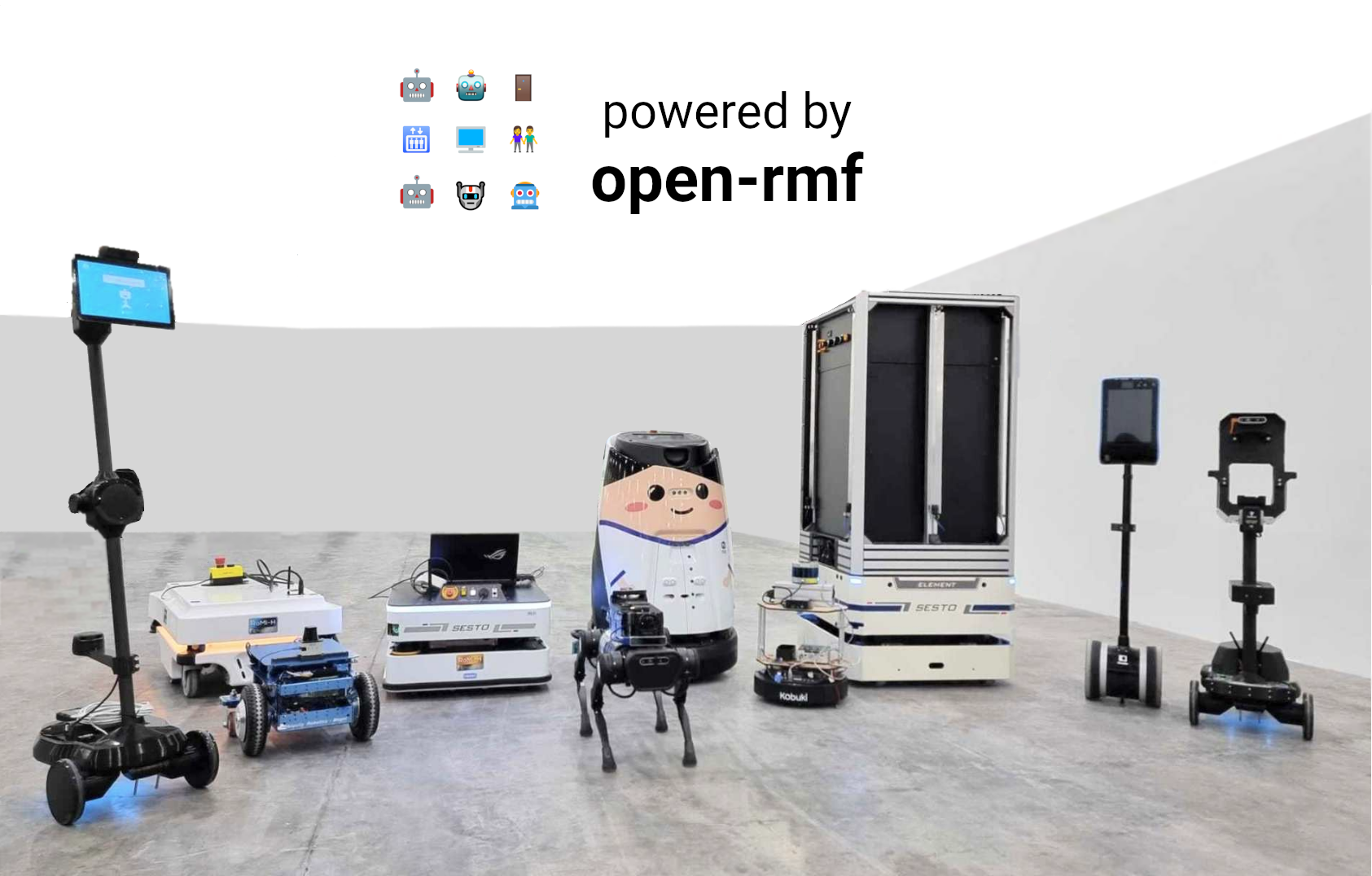The OpenRMF platform for multi-fleet robot management.
For specific rmf versions follow the instructions given below:
These are the current Open-RMF binary releases available:
| RMF Version | Installation Instructions | Supported distros | Supported ROS2 versions |
|---|---|---|---|
| 21.09 | Installation instructions | Ubuntu 20.04, Ubuntu 21.09, RHEL 8 (deployment only) | Foxy, Galactic |
| 22.02 | Installation instructions | Ubuntu 22.04 | Humble |
Install all non-ROS dependencies of OpenRMF packages,
sudo apt update && sudo apt install \
git cmake python3-vcstool curl \
qt5-default \
-y
python3 -m pip install flask-socketio fastapi uvicorn
sudo apt-get install python3-colcon*rosdep helps install dependencies for ROS packages across various distros. It can be installed with:
sudo apt install python3-rosdep
sudo rosdep init
rosdep updateSetup a new ROS 2 workspace and pull in the demo repositories using vcs,
mkdir -p ~/rmf_ws/src
cd ~/rmf_ws
wget https://raw.githubusercontent.com/open-rmf/rmf/main/rmf.repos
vcs import src < rmf.reposEnsure all ROS 2 prerequisites are fulfilled,
you can subsutitute your distro name for <your ros distro>
Example:
for galactic
cd ~/rmf_ws
rosdep install --from-paths src --ignore-src --rosdistro galactic -yNOTE: Due to newer changes in the source build, there might be conflicts and compilation errors with older header files installed by the binaries. Please remove the binary installations before building from source, using
sudo apt remove ros-galactic-rmf*.
Compiling on Ubuntu 20.04:
cd ~/rmf_ws
source /opt/ros/<your ros distro>/setup.bash
colcon build --cmake-args -DCMAKE_BUILD_TYPE=ReleaseNOTE: The first time the build occurs, many simulation models will be downloaded from Ignition Fuel to populate the scene when the simulation is run. As a result, the first build can take a very long time depending on the server load and your Internet connection (for example, 60 minutes).
Alternatively, you can run RMF Demos by using docker.
Pull docker image from open-rmf/rmf github registry (setup refer here).
docker pull ghcr.io/open-rmf/rmf/rmf_demos:latest
docker tag ghcr.io/open-rmf/rmf/rmf_demos:latest rmf:latestRun it!
docker run -it --network host rmf:latest bash -c "export ROS_DOMAIN_ID=9; ros2 launch rmf_demos_gz office.launch.xml headless:=1"This will run rmf_demos in headless mode. Open this link with a browser to start a task.
(Experimental) User can also run rmf_demos in “non-headless” graphical form, via rocker.
Demonstrations of OpenRMF are shown in rmf_demos.
A near-term roadmap of the entire OpenRMF project (including and beyond rmf_traffic) can be found in the user manual here.
Instructions on how to integrate your system with OpenRMF can be found here.
A number of commercial robots have been integrated with RMF and links to their adapters are available below.
- Gaussian Ecobots
- OTTO Motors (and robots running the Clearpath Autonomy stack)
- Mobile Industrial Robots: MiR
- Temi- the personal robot
Help us add to this list!
A helpful starting point for integrating your fleet with RMF is the fleet_adapter_template package.
